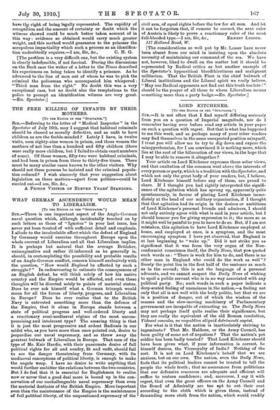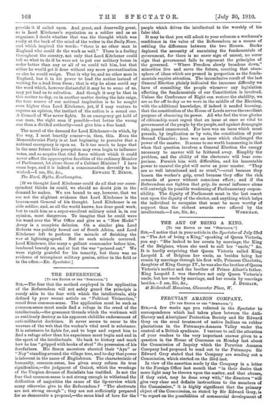LORD KITCHENER.
[To THE EDITOR OF THE "SPECTATOR."] Sts,—It is not often that I find myself differing seriously from you on a question of Imperial magnitude, nor do I remember having ever before read any article in your paper on such a question with regret. But that is what has happened to me this week, and as perhaps many of your other readers may find themselves in the same unexpected position as:myself, I trust you will allow me to try to dig down and expose the misapprehension, for I am convinced it is nothing more, which lies at the root of the bifurcation of our views, in the hope that I may be able to remove it altogether ?
Your article on Lord Kitchener expresses those sober views, and that exaltation of the common weal above the interests of every person or party, which is a tradition with the Spectator, and which not only the great body of your readers, but, I believe, Lord Kitchener himself before any of them, are proud to share. If I thought you had rightly interpreted the signifi- cance of the agitation which has sprung up, apparently quite spontaneously, in favour of placing Lord Kitchener imme- diately at the head of our military organisation, if I thought that that agitation had its origin in the desires or ambitions of Lord Kitchener's personal friends and admirers, I should not only entirely agree with what is said in your article, but I should honour you for giving expression to it; the more so as it might well be painful to you to have to do so. Bat, if I am not mistaken, this agitation to have Lord Kitchener employed at home, and employed at once, is a symptom, and the most encouraging symptom I have yet observed, that England is at last beginning to " wake up." Did it not strike you as significant that it was from the very organ of the Non- conformist conscience itself, the Daily News, that you quoted such words as : " There is work for him to do, and there is no other man in England who could do the work as .well"? Surely the point lies in the first half of the sentence as much as in the second; this is not the language of a personal advocate, and we cannot suspect the Daily News of wishing to spoil a public servant who is in no way associated with any political party. No; such words in such a paper indicate a deep-seated feeling of uneasiness in the nation,—a feeling not only that all is not well with the body politic, but that we are in a position of danger, out of which the wisdom of the masses and the slow-moving maohinery of Parliamentary government are incapable of extracting us. The Daily News may not perhaps itself quite realise their significance, but they are really the equivalent of the old Roman resolution, Videant consoles, ne respublica aliguid detrimenti caplet.
For what is it that the nation is inarticulately striving to ingeminate P That Mr. Haldane, or the Army Council, has been guilty of some act of nepotism P That the nation's pet soldier has been badly treated? That Lord Kitchener should have been given what, if your information is correct, he himself desires, the Viceroyalty of India P Nothing of the
sort. It is not on Lord Kitchener's behalf that we are anxious, but on our own. The nation, even the Daily News,
feels that its political leaders cannot be trusted to tell the people the whole truth ; that no assurances from politicians that our defensive resources are adequate and efficient will suffice to restore confidence ; and, moreover, I say it with regret, that even the great officers on the Army Council and the Board of Admiralty are too apt to cut their coat according to the cloth which is given them, instead of demanding more cloth from the nation, which would readily
provide it if called upon. And great, and deservedly great, as is Lord Kitchener's reputation as a soldier and as an organiser, I doubt whether that was the thought which was really at the back of the mind of the writer in the Daily News, and which inspired the words : " there is no other man in England who could do the work as well." There is a feeling throughout the country, not only that Lord Kitchener could tell us what to do if he were set to put our military house in order better than any or all of us could tell him, but that either he would get it done without any more procrastination or else he would resign. That is why he, and no other man in England, has it in his power to lead the nation instead of waiting for a lead from them ; that is why he alone could say the word which, however distasteful it may be to some of us, may yet lead us to salvation. And though it may be that in this matter to-day, as in another matter during the late reign, the true source of our national inspiration is to be sought even higher than Lord Kitchener, yet, if I may venture to express an opinion, the instinct of the nation is a sound one. A Council of War never fights. In an emergency get hold of one man, the right man if possible—but better the wrong one than a divided authority—and give him a free hand.
The moral of the demand for Lord Kitchener—in which, by the way, I most heartily concur—is, then, this. Even the Nonconformist Party is at last beginning to perceive that a national emergency is upon us. Is it too much to hope that in the near future this perception may even begin to influence votes, and so acquire that vital force without which it could never affect the apperceptive faculties of the ordinary Member of Parliament, let alone those of a Cabinet Minister P I have some hope, and it is indeed a consummation devoutly to be wished.—I am, Sir, &c., EDWARD T. Ducat. The Hard, Hythe, Southampton.
LH we thought Lord Kitchener could do all that our corre- spondent thinks he could, we should no doubt join in the demand he makes. We are bound to say, however, that we see not the slightest evidence that Lord Kitchener is the heaven-sent General of his thought. Lord Kitchener is an able soldier, and, as all the world knows, has done good work, but to exalt him as a super-excellent military mind is, in our opinion, most dangerous. To imagine that he could wave his wand over the War Office and give us a "New Model" Army is a complete delusion. On a similar plea Lord Roberts was politely bowed out of South Africa, and Lord Kitchener left to perform the miracle of finishing the war at lightning-speed. But no such miracle occurred. Lord Kitchener, like many a gallant commander before him, lumbered bravely on, and at last the war "petered out." We were rightly grateful for his tenacity, but there was no evidence of triumphant military genius, either in the field or in the office.—ED. Spectator.]







































 Previous page
Previous page